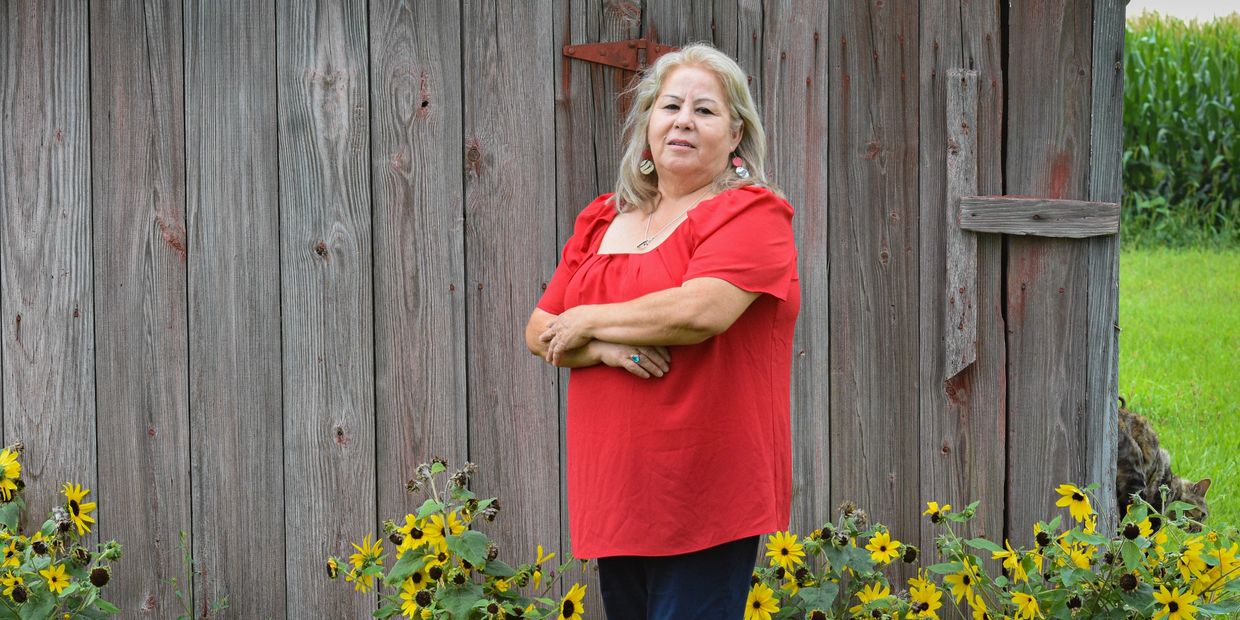Magdalena

Magdalena's Story
My name is Magdalena, and I have been a farmworker for more than 45 years, since I was 18 years old. My family migrates to Ohio from Texas for the harvest season. For our first 30 years in the area, we worked for the same farmer harvesting tomatoes. When he retired, we moved to another farmer. We have been with him for 15 years harvesting cucumbers. I am proud of the fact that my family and I have been able to come back to the same county for this long and always have a steady job.
My children are grown now and no longer travel with us; so it is just me and my husband traveling to Ohio. While we are here, we live and interact with other farmworkers. It used to be that at least 15 other farmworker families traveled to work at the same farm where we work, but lately, it is mostly H2A workers that work with us.
Farmworkers and farmers are dependent on each other. If the farmer treats you well you keep coming back to work for him, but if we do not do our work, then we aren’t asked back. Being a farmworker is hard because we work under the heat and the sun, but I enjoy my job.
Even though we are glad to have had the opportunity to work in Ohio for all of these years, I think it is important that people understand that there is still racism here. Farmworkers experience it every day, especially in our healthcare. There is very little access to interpreters, and the hours are not accessible to us. We all have to go to the one clinic, once a month. Most of the workers do not speak English so I help to translate. It seems like they are being taken advantage of because they do not speak English. Through these experiences, I am witness to the mistreatment they experience, in addition to the mistreatment that my family experiences.
En Español:
Mi nombre es Magdalena. Soy trabajadora agrícola desde hace más de 45 años, desde que tenía 18 años. Mi familia migra a Ohio desde Texas para la temporada de cosecha. Durante nuestros primeros 30 años en el estado, trabajamos para el mismo agricultor cosechando tomates. Cuando se jubiló, nos mudamos a otro agricultor. Llevamos 15 años con él cosechando pepinos. Estoy orgullosa del hecho de que mi familia y yo hemos podido regresar al mismo condado durante tanto tiempo y siempre tener un trabajo estable.
Mis hijos son mayores ahora y no viajan con nosotros, por lo que solo mi esposo y yo viajamos a Ohio. Mientras estamos aquí, vivimos e interactuamos con otros trabajadores agrícolas. Antes eran al menos 15 otras familias de trabajadores agrícolas que venían al mismo rancho donde trabajamos, pero últimamente, son en su mayoría trabajadores H2A los que trabajan con nosotros.
Los trabajadores agrícolas y los rancheros dependen unos de otros. Si el ranchero te trata bien, sigues volviendo a trabajar para él, pero si no hacemos nuestro trabajo, no se nos pide que regresemos. Ser trabajadores agrícolas es difícil porque trabajamos bajo el calor y el sol, pero disfruto de mi trabajo.
Aunque estamos contentos de haber tenido la oportunidad de trabajar en Ohio durante todos estos años, creo que es importante que la gente comprenda que todavía hay racismo aquí. Los trabajadores agrícolas lo viven todos los días, especialmente en nuestro cuidado médico. Hay muy poco acceso a intérpretes y los horarios no son accesibles para nosotros. Todos tenemos que ir a una sola clínica, una vez al mes. Muchos de los trabajadores no hablan inglés, así que yo ayudo a traducir. Parece que se están aprovechando de ellos porque no hablan inglés. A través de estas experiencias, soy testigo del maltrato que ellos viven, además del maltrato que vive mi familia.
Call to Action
Want to support the people who sustain your community?
Many migrant women workers, including farmworkers, face workplace conditions that worsen mental health, such as harassment in the workplace, wage theft and lack of paid family leave. People who migrate for work, such as those employed in agriculture, face a variety of challenges with accessing mental health care. Join Justice for Migrant Women as we call on our elected leaders to expand access to mental health resources for all people employed in agriculture.
Copyright © 2025 Justice for Migrant Women - All Rights Reserved.
Justice for Migrant Women is a nonprofit, tax-exempt 501(c)(3) organization (EIN: 83-3607138).
Click here to view J4MW's state nonprofit disclosures.
This website uses cookies.
We use cookies to analyze website traffic and optimize your website experience. By accepting our use of cookies, your data will be aggregated with all other user data.